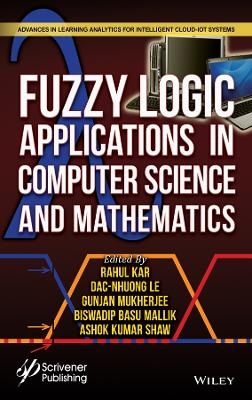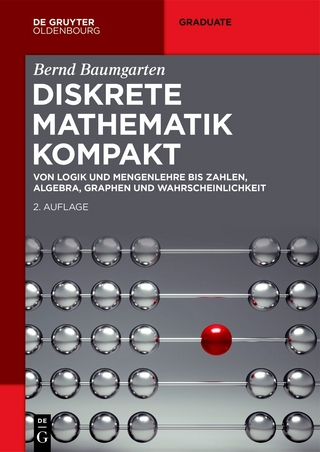
Fuzzy Logic Applications in Computer Science and Mathematics
Wiley-Scrivener (Verlag)
978-1-394-17453-9 (ISBN)
- Lieferbar
- Versandkostenfrei
- Auch auf Rechnung
- Artikel merken
The basic steps of fuzzy inference systems starting from the core foundation of the fuzzy concepts are presented in this book. The fuzzy theory is a mathematical concept and, at the same time, it is applied to many versatile engineering fields and research domains related to computer science. The fuzzy system offers some knowledge about uncertainty and is also related to the theory of probability. A fuzzy logic-based model acts as the classifier for many different types of data belonging to several classes.
Covered in this book are topics such as the fundamental concepts of mathematics, fuzzy logic concepts, probability and possibility theories, and evolutionary computing to some extent. The combined fields of neural network and fuzzy domain (known as the neuro-fuzzy system) are explained and elaborated. Each chapter has been produced in a very lucid manner, with grading from simple to complex to accommodate the anticipated different audiences. The application-oriented approach is the unique feature of this book.
Audience
This book will be read and used by a broad audience including applied mathematicians, computer scientists, and industry engineers.
Rahul Kar, PhD, is working as a state-aided teacher of mathematics, Faculty of Kalyani Mahavidyalaya, Nadia, West Bengal, India. Dac-Nhuong Le, PhD, is an associate professor of computer science and deputy head of the Faculty of Information Technology, Haiphong University, Vietnam. Gunjan Mukherjee, PhD, is an assistant professor in the Department of Computational Science, Brainware University, Kolkata, India. Biswadip Basu Mallik, PhD, is a senior assistant professor of mathematics in the Department of Basic Sciences & Humanities, Institute of Engineering & Management, Kolkata, India. Ashok Kumar Shaw, PhD, is an applied mathematician and professor and Dean of R&D at the Budge Budge Institute of Technology, Kolkata, India.
Preface xiii
1 Decision Making Using Fuzzy Logic Using Multicriteria 1
Panem Charanarur, Srinivasa Rao Gundu and J.Vijaylaxmi
1.1 Introduction 2
1.2 Fuzzy Logic 5
1.3 Decision Making 6
1.4 Literature Review 7
1.5 Conclusion 10
2 Application of Fuzzy Logic in the Context of Risk Management 13
Sudipta Adhikary and Kaushik Banerjee
2.1 Introduction 13
2.2 Objectives of Risk Management 14
2.3 Improved Risk Estimation 15
2.4 Threat at Quantification Matrix 17
2.5 Fundamental Definitions 18
2.6 Fuzzy Logic 19
2.7 Risk Related to Fuzzy Matrix 20
2.8 Conclusion 26
3 Use of Fuzzy Logic for Controlling Greenhouse Environment: Study Through the Lens of Web Monitoring 29
Kaushik Banerjee and Sudipta Adhikary
3.1 Introduction 29
3.2 Design (Hardware) 30
3.3 Programming Arduino Mega Board 31
3.4 Implementation of a Prototype 34
3.5 Results 35
3.6 Conclusion 37
4 Fuzzy Logics and Marketing Decisions 41
Mohammed Majeed
4.1 Introduction 41
4.2 Literature 42
4.3 Conclusion 46
4.4 Further Studies 47
5 A Method for Ranking Fuzzy Numbers Based on Their Value, Ambiguity, Fuzziness, and Vagueness 51
Sunayana Saikia and Rituparna Chutia
5.1 Introduction 51
5.2 Preliminaries 54
5.3 The Designed Method 56
5.4 Validate the Reasonableness of the Suggested Ranking Algorithm 68
5.5 Comparative Analysis and Numerical Examples 75
5.6 Application 87
5.7 Conclusions 94
6 Evacuation of Attributes to Translucent TNSET in Mathematics Using Rough Topology 99
Kala Raja Mohan, R. Narmada Devi, Nagadevi Bala Nagaram, Sathish Kumar Kumaravel and Regan Murugesan
6.1 Introduction 99
6.2 Basic Concepts of Rough Topology 100
6.3 Algorithm 102
6.4 Information System 102
6.5 Working Procedure 104
6.6 Conclusion 104
7 Design of Type-2 Fuzzy Controller for Hybrid Multi-Area Power System 107
Susmit Chakraborty, Arindam Mondal and Soumen Biswas
7.1 Introduction 108
7.2 Plant Model 108
7.3 Controller Design 109
7.4 Levenberg-Marquardt Algorithm 115
7.5 Optimization of Controller Parameters Using CASO Algorithm 116
7.6 Result and Analysis 116
7.7 Conclusion 121
8 Alzheimer's Detection and Classification Using Fine-Tuned Convolutional Neural Network 125
Anooja Ali, Sarvamangala D. R., Meenakshi Sundaram A. and Rashmi C.
8.1 Introduction 125
8.2 Literature Review 129
8.3 Methodology 133
8.3.1 Dataset 134
8.3.2 Pre-Processing 134
8.4 Implementation and Results 134
8.5 Conclusion 138
9 Design of Fuzzy Logic-Based Smart Cars Using Scilab 143
Josiga S., Maheswari R. and Subbulakshmi T.
9.1 Introduction 143
9.2 Literature Survey 145
9.3 Proposed Fuzzy Inference System for Smart Cars 149
9.4 Implementation Details and Results 155
9.5 Conclusion and Future Work 156
10 Financial Planning and Decision Making for Students Using Fuzzy Logic 159
G. Surya Deepan and T. Subbulakshmi
10.1 Introduction 159
10.2 Literature Review 161
10.3 System Architecture 163
10.4 Conclusion and Future Scope 169
11 A Novel Fuzzy Logic (FL) Algorithm for the Automatic Detection of Oral Cancer 173
M. Praveena Kiruba bai and G. Arumugam
11.1 Introduction 173
11.2 Image Enhancement 174
11.3 Gabor Transform 175
11.4 Image Transformation 175
11.5 Adaptive Networks: Architecture 176
11.6 Results and Discussions 177
11.7 Conclusion 177
12 A Study on Decision Making of Difficulties Faced by Indian Workers Abroad by Using Rough Topology 179
Nagadevi Bala Nagaram, R. Narmada Devi , Kala Raja Mohan, Regan Murugesan and Sathish Kumar Kumaravel
12.1 Introduction 179
12.2 Fundamental Idea of Rough Topology 182
12.3 Algorithm 183
12.4 Information System 183
12.5 Working Procedure 185
12.6 Conclusion 185
13 Case Study on Fuzzy Logic: Fuzzy Logic-Based PID Controller to Tune the DC Motor Speed 187
Devendra Kumar Somwanshi
13.1 Introduction 188
13.2 Literature Review 190
13.3 Design of Fuzzy-Based PID Controller 196
13.4 Experimental Work and Results Analysis 205
13.5 Conclusion and Future Scope 207
14 Application of Intuitionistic Fuzzy Network Using Efficient Domination 213
A. Meenakshi, J. Senbagamalar and A. Kannan
14.1 Introduction 213
14.2 Efficient Domination in Intuitionistic Fuzzy Graph (IFG) 215
14.3 Main Frame Work 217
14.4 Secret Key 219
14.5 Illustration 224
14.6 Conclusion 231
15 Analysis of Parameters Related to Malaria with Comparative Study on Fuzzy Cognitive Maps and Neutrosophic Cognitive Maps 233
Regan Murugesan, Sathish Kumar Kumaravel, Kala Raja Mohan, Narmada Devi Rathinam and Suresh Rasappan
15.1 Introduction 233
15.2 Parameters of Malaria 235
15.3 Fuzzy Cognitive Map 235
15.4 Neutrosophic Cognitive Map 240
15.5 Comparison and Discussion 246
15.6 Conclusion 247
16 Applications of Fuzzy Cognitive Maps and Neutrosophic Cognitive Maps on Analysis of Dengue Fever 249
Sathish Kumar Kumaravel, Regan Murugesan, Nagadevi Bala Nagaram, Suresh Rasappan and G. Yamini
16.1 Introduction 249
16.2 Parameters of Dengue 251
16.3 Fuzzy Cognitive Maps 251
16.4 Neutrosophic Cognitive Map 257
16.5 Comparison and Discussion 263
16.6 Conclusion 264
17 A Comprehensive Review and Analysis of the Plethora of Branches of Medical Science and Bioinformatics Based on Fuzzy Logic 267
Partha Sarker and Siddhartha Roy
17.1 Introduction 267
17.2 Previous Work 271
17.3 Fuzzy Logic in Medical Fields and Bioinformatics 271
17.4 Review of Published Work and In-Depth Analysis 273
17.5 Conclusion 273
References 277
Index 279
| Erscheinungsdatum | 27.09.2023 |
|---|---|
| Sprache | englisch |
| Gewicht | 685 g |
| Themenwelt | Mathematik / Informatik ► Mathematik |
| Technik ► Elektrotechnik / Energietechnik | |
| ISBN-10 | 1-394-17453-5 / 1394174535 |
| ISBN-13 | 978-1-394-17453-9 / 9781394174539 |
| Zustand | Neuware |
| Haben Sie eine Frage zum Produkt? |
aus dem Bereich


